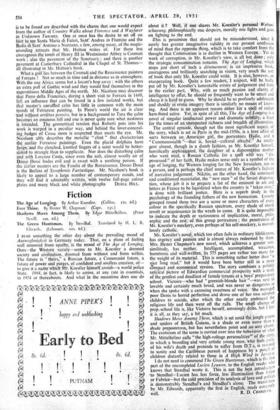Fiction
Shadows Move Among Them. By Edgar Mittelholzer. (Peter Ncvill. ios. 6d.) I READ something the other day about the prevailing mood of Ausweglosigkeit in Germany today. That, on a plane of feeling well removed from apathy, is the mood of The Age of Longing. Ours—the Western variety—seems to Mr. Koestler a doomed society and civilisation,. doomed from without and from within. The future is " theirs, ' a Russian future, a Communist future, a future of power and purges, of confident and soulless creation, of— to give it a name"which-Mr. Koestler himself avoids—a world police State. 1984, in fact, is likely to arrive, at any rate in essentials, in 1954 or thereabouts. And what in the meantime does one do about it ? Well, if one shares Mr. Koestler's personal Weltan- schauung, philosophically one despairs, morally one fights and goes on fighting to the end.
This is pessimism that should not be misunderstood, since it surely has greater imaginative validity in our present confusion of mind than the opposite- thing, which is to take comfort from the thought that Communism is in decline in Western Europe. Yet its work of corruption, in Mr. Koestler's view, is all but done ; only
the strategic consummation remains. The Age -of Lohging, which stops just short of such a denouement; is an impressive book, courageous and brilliantly searching in vision, very much the sort
of book that only Mr. Koestler could write. It is also,: however, an exasperating book. Quite a feW readers,_ 1 suspect, Will be badly put off by Mr. Koestler's lamentable errors of judgement and taste in the earlier; part. Why, with so much passion and clarity of intelligence to offer, he should so frequently want to be smart and cheap it is bird to guess. Why he should be so profusely adolescent
and shoddy in erotic imagery there is similarly no means of know- ing. And there is no apparent reason either fOr a spell of rather ham-fisted satire. Yet, in spite of:all this, The Age of.Longing is a
novel of singular intellectual power and dramatic subtlety, a tract for the times of art unexpected richness and breadth of jllustration. The central episode; though not the most significant aspect, of the story, which is set in Paris in the mid-1950s, is a love affair of
sorts between an.' American girl,, the „portentous Hydie, and a "Commonwealth "—that is, Soviet—cultural affaché/ As intelli-
gent almost, though in a dumb faihion, as Mr. Koestler himself,
horrifically Sophisticated, The datighter of a dipsomaniac mother who went mad, a Roman 'Catholic for a spell wht- was " dis-
possessed." of her faith, Hydie makes sense only as a symbol of the
age of longing, the Western longing for the New Jerusalem, not as a person, and is perhaps the chief source of Mr. Koestler's failures
of narrative judgement. Nikitin, on the other hand, the convinced and conditioned materialist, the " new man " of the Soviet dispensa tion, whose job -it is to prepare a list of the eminent in art and letters in France to be liquidated when the country is " taken over," is done with brilliant justice. Here is a superb study in the Psychology of the-founding fathers of the new humanism. Loosely grouped round these two are a score or more characters of every colour in the specifically Russian spectrum, every shade of moral revolt or acquiescence in the wrath to come. It is quite impossible to .indicate the depth or variousness of implication, moral, philo- sophic and the rest; of this group portraiture ; the penetration of Mr. Koestler's mockery„even perhaps of his self-mockery, is marvel- lously catholic. Mr. Koestler's novel, which too often fails in ordinary lifelikeness. has urgency and passion and is almost always redeemed by them. Mrs. Hester Chapman's new novel, which achieves a greater veri-
similitude, has neither. Intelligent, accomplished, vivacious, humoroils and Will:written; its 575 pages are rather too many for
the weight of its material. This is something rather better than "a
i*e long read," but it would have been better still in a more ampact and_economical Version. The story combines a politely
satirical picture of Edwardian commercial prosperity with a study of the gentlest and deadliest of female tyrants at a boys' preparatory school. Victoire—who had "greenish-blonde hiir "—was next to lovable and certainly much loved, and was never so dangerous as
when she spoke with a caressing sweetness of voice. She managed poor Denis to horrid perfection and drove one of her two adopted children to suicide, after which the other nearly embraced the religious life and then 'went off the- rails. The small change of prep.-school life is, like Victoire herself, amusingly done. but I for it is all, as they say, a bit much. Shadows Move Among Them, which is set amid the jungle greens and spiders of British Guiana, is a shade or even- more than 3
shade preposterous, but has nevertheless point and an. airy charm.
The exoticism of the scene is carried over into the behaviour of what Mr. Mittelholzer calls " the high-voltage personalities' of the story.
in which a brooding and very artistic young man, who feels gullY of his wife's death and pretends to suffer from D.T.s, is restoreJ to sanity and the Caribbean pursuit of happiness by a parcel of children distantly related to those in A High Wind in larnaica.
I do not need to commend The Green Huntsman, which is the first part of the uncompleted Lucien Leuwen, to the English reader %.110
knows that Stendhal wrote it. • This is not the best introduction to Stendhal—Lucien has less force, less illumination than Julien or Fabrics—but the cold precision of its analysis of love and politics is demonstrably Stendhal's and Stendhal's alone. The translation by Mr. Edwards, apparently the first in English, reads extreme.


































 Previous page
Previous page